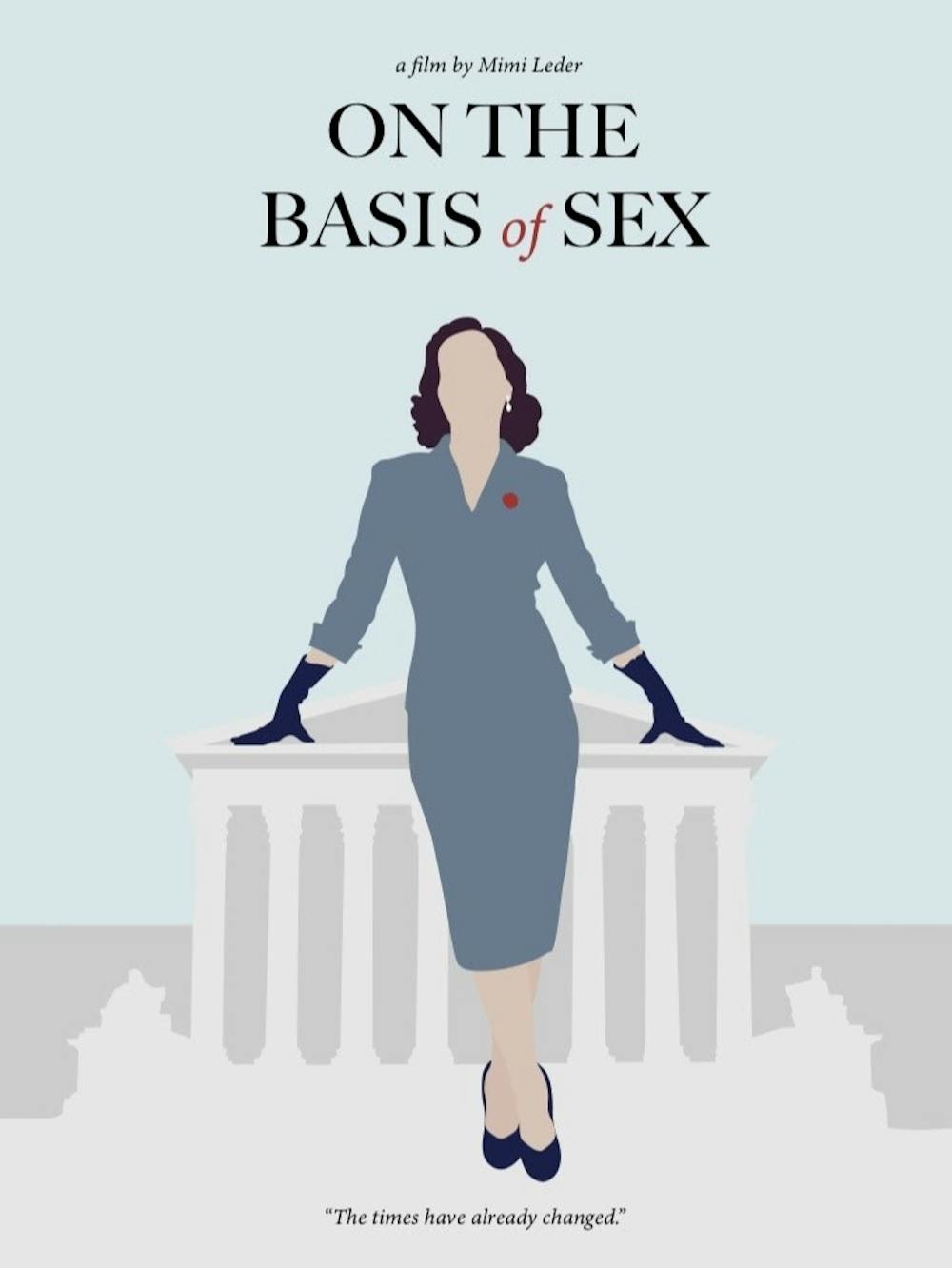It is 1956, just the sixth year that women were admitted to Harvard Law School. “Why are you occupying a place at Harvard that could have gone to a man?” asks Dean Erwin Griswold (Sam Waterston) at a welcome dinner for the nine women admitted to the law school’s incoming class of over 550 students. Among them is a young Ruth Bader Ginsburg (Felicity Jones). She replies that she is studying law to “become a more patient and understanding wife,” making it evident that women were not welcome in the field of law at the time.
Directed by Mimi Leder and written by Daniel Stiepleman (Ruth Bader Ginsburg’s real-life nephew), “On the Basis of Sex” follows the early life of Ruth Bader Ginsburg before she became the beloved Supreme Court Justice and the “Notorious RBG” later in her career. At the film’s start, Ginsburg enters Harvard as a bright, optimistic first-year law student who excels in her studies while raising her daughter Jane (Cailee Spaeny) alongside Martin “Marty” Ginsburg (Armie Hammer), her husband and a second-year Harvard Law student.
When Marty is diagnosed with testicular cancer, Ginsburg attends his classes in addition to her own. After he recovers and lands a job in New York City, their family of three relocates so that Ginsburg can care for Marty in case he relapses. However, Dean Griswold refuses to allow Ginsburg to transfer and graduate with a Harvard degree — an alternative option afforded to male students in the past. Thus, Ginsburg chooses to cut ties with Harvard and transfer to Columbia Law School, where she graduates at the top of her class.
Despite Ginsburg’s stellar academic record and work ethic, every law firm refuses to hire her solely because she is a woman. As a result, Ginsburg becomes a professor at Rutgers Law School, teaching a course called “Sex, Discrimination, and the Law.” Although Ginsburg cares for her students, she feels limited by lectures and lesson plans. Instead, she dreams of practicing law and creating social change.
Ginsburg’s frustration comes to a head when Marty naively remarks, “You’re out there training the next generation of lawyers to change the world.” Unable to contain her disappointment any longer, she explains why she is frustrated: “Because that’s what I wanted to do!”
Ginsburg’s chance to do just this arises from an unlikely source: Moritz v. Commissioner, a tax law case given to her by Marty. The case was filed by Charles Moritz (Chris Mulkey), an unmarried man who was denied a tax deduction for being his aging mother’s caregiver because the tax law applied exclusively to women or widowers. The case represents a novel example of discrimination on the basis of sex against a man rather than a woman. For Ginsburg, it is an opportunity to “topple the whole damn system.”
Jones shines as Ginsburg and captures her tenacity and strength inside and outside the courtroom. She and Hammer are delightful as the husband-wife attorney duo. They maintain an equal partnership while supporting one another and juggling their careers and kids, a rare sight in the 1950s. They are aided by a roster of lively characters, including Melvin “Mel” Wulf (Justin Theroux) of the American Civil Liberties Union (ACLU) and Dorothy Kenyon (Kathy Bates), a women’s rights attorney and one of Ginsburg’s role models.
Another highlight of “On the Basis of Sex” is its emphasis on the various forms of activism, each different yet valuable. While Ginsburg turns to the law as a means of advancing women’s rights, her daughter Jane takes to marching in the streets. The film recognizes that both types of protest are necessary to enact meaningful long-term change. “The country isn’t ready. Change minds first. Then change the law,” says Kenyon to Ginsburg. However, Jane and the younger generation’s activism is proof that the times have already changed, and it is time for the laws to change to reflect the nation’s progress.

Sharing Ginsburg’s story is all the more meaningful following her tragic death in September 2020 after a long battle with pancreatic cancer. After winning Moritz v. Commissioner with a unanimous vote, Ginsburg went on to become a leading advocate for gender equality in the United States. In 1972, she founded the Women’s Rights Project at the ACLU, a campaign that empowers women and fights gender discrimination through community outreach, advocacy, and litigation. As an attorney at the ACLU, Ginsburg was involved in 34 Supreme Court cases, and she won five out of the six women’s rights cases she argued.
In 1980, President Jimmy Carter appointed Ginsburg to serve on the U.S. Court of Appeals for the District of Columbia Circuit. Then, in 1993, President Bill Clinton nominated Ginsburg for the Supreme Court. She was later confirmed by the Senate in a 93-6 vote and became the second woman to ever serve on the Supreme Court. During her time on the Court, Ginsburg played a key role in protecting civil liberties in landmark cases such as United States v. Virginia. Both as an attorney at law and a Supreme Court Justice, Ginsburg spent her entire legal career working to advance the rights of women and marginalized groups.
“On the Basis of Sex” honors the life and legacy of Ginsburg, who is remembered as one of the most respected and influential figures in modern political life. With a charming screenplay and moving lead performances, the film offers viewers a glimpse into Ginsburg’s life as a lawyer and professor as well as a wife and mother. Ginsburg’s commitment to social justice and refusal to settle for less than she deserves is present in every scene, reminding the audience that the fight towards equality is not yet finished.
The USG Movies program, sponsored by Undergraduate Student Government, typically brings films to the Princeton Garden Theatre for free student viewing. The program has adapted to the virtual semester by unlocking a new movie each Thursday on Canvas and hosting a discussion of the week’s movie each Saturday at 9 p.m. All films can be streamed for free by University students.

“On the Basis of Sex” is avaliable for streaming on Amazon Prime, iTunes, and YouTube.








